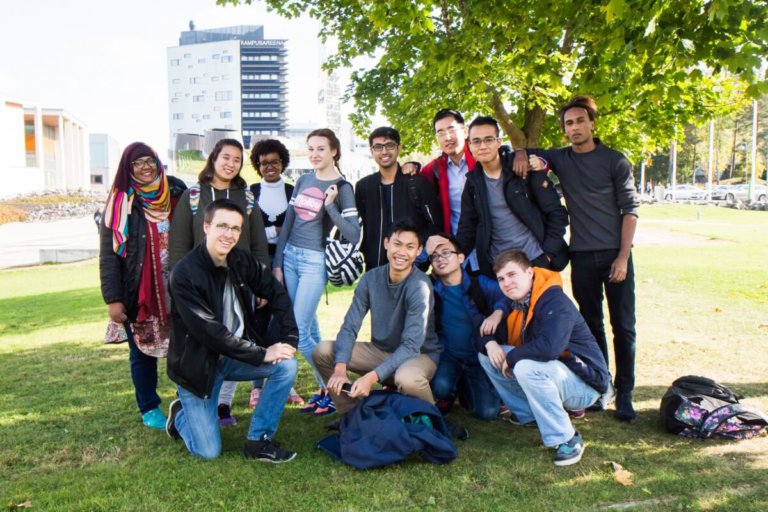
The electrical engineer is one of the most underrated creators in our world today. Their contributions go unnoticed in many things we see, use and experience around us. From our smartphones to our GPS systems and laptops, electrical engineering forms the building blocks of some of the most in-demand items today. These professionals stand at the forefront of the technological revolution.
Universities – the research they produce and the talent they develop – are critical to the changes we see in our global, digital and multicultural society. And Tampere University is leading Europe’s charge.
At Finland’s second-largest university, the study of electrical engineering at the Faculty of Information Technology and Communication Sciences (ITC) draws on a unique combination of recognised expertise across a range of disciplines. From the humanities, to engineering, the natural sciences and even theatre and drama, multidisciplinary research and teaching have no qualms crossing boundaries for the sake of advancing knowledge.
What this means for students is that they don’t just gain in-depth technical knowledge, but also revel in the chance to create new knowledge.
 The Master in Electrical Engineering, Smart Grids provides a comprehensive range of technical design and analysis skills. Smart grids enhance the effectiveness, stability and reliability of the systems and integrate distributed energy resources into system management. Applicants with an undergraduate background in electrical engineering can specialise in this sub-field through this programme, which covers component level (design and control of power electronic converters), networks (distribution and transmission grids) and systems (electricity market and ICT/automation).
The Master in Electrical Engineering, Smart Grids provides a comprehensive range of technical design and analysis skills. Smart grids enhance the effectiveness, stability and reliability of the systems and integrate distributed energy resources into system management. Applicants with an undergraduate background in electrical engineering can specialise in this sub-field through this programme, which covers component level (design and control of power electronic converters), networks (distribution and transmission grids) and systems (electricity market and ICT/automation).
As wireless communications and radio frequency (RF) technologies become more prevalent, it’s getting harder to deny the pioneering characteristic of the Master in Electrical Engineering, Wireless Communications and RF Systems. As the world embraces the Internet of Things (IoT), 5G and the Industrial Internet, applications ranging from everyday consumer products to high-end industrial machines and robots and space science will be needed to create this vision of a programmable and connected world. This degree gives students the extensive competencies and required fundamental understanding to work as an R&D engineer, designer or other demanding expert engineering positions in this fast-growing sub-field.
All the courses, exams and student services for both postgraduate programmes are arranged in English.
Excellent global career prospects
Electricity has played a pivotal role in many of the most important inventions in modern history. As we head into the Fourth Industrial Revolution, its importance will grow larger still. Add to that the many crises that urgently need solutions, from our environment to mass migration and poverty, it’s clear how in-demand electrical engineers are and will continue to be.
EngineeringUK’s report in 2015 found a current annual shortfall of 55,000 engineers in the United Kingdom, or as described, a “massive shortage of skills” needed to power its economy. In 2014, Germany had a reported 12,070 vacancies for electrical engineers alone, according to Tina Lackmann, a consultant with the Association of German Engineers (VDI), which rounds up to three vacancies per unemployed electrical engineer.
Similar demand is seen outside of Europe. The US Bureau of Labor Statistics projects a seven percent growth in overall employment for electrical and electronics engineers from 2016 to 2026. Their median pay of US$99,070 per year makes them one of the most highly-paid engineering sub-fields in the nation. They are just as in-demand up north in Canada, making it to the top 15 most in-demand jobs in 2019, as found by market intelligence firm Gartner Talent Neuron.
Tampere students will graduate into a world that appreciates the talent and skills they have to offer. After all, they are entering the industry armed not only with knowledge of fundamental concepts and practical problem-solving skills, but also the experience of working with hands-on projects and state-of-the-art simulation, design and measurement tools used in industry.
 Its track record already shows impressive rates for employability. Master’s in Electrical Engineering, Wireless Communications and RF Systems graduates are typically employed by mobile communication network operators, R&D houses, wireless chipset, device and network vendors, consulting companies and research institutes. They can also enjoy a broad range of career prospects in the smart energy, transportation and automotive industries, as well as in different production and manufacturing industries outside of the basic ICT field. More academically-inclined graduates are eligible to apply for admission to doctoral programmes in Finland or abroad.
Its track record already shows impressive rates for employability. Master’s in Electrical Engineering, Wireless Communications and RF Systems graduates are typically employed by mobile communication network operators, R&D houses, wireless chipset, device and network vendors, consulting companies and research institutes. They can also enjoy a broad range of career prospects in the smart energy, transportation and automotive industries, as well as in different production and manufacturing industries outside of the basic ICT field. More academically-inclined graduates are eligible to apply for admission to doctoral programmes in Finland or abroad.
Graduates of the Master’s in Electrical Engineering, Smart Grids, can seek work at companies that manufacture power electronic, power engineering and specialised smart grid components – design, research and development, project management and marketing roles are up to their preference. Similarly, electricity production, transmission and distribution companies, energy retailers and other power companies have high needs for graduates with Tampere’s skillsets; as do non-traditional employers like software vendors and start-up companies specialising in the energy business and smart grids.
Follow Tampere University on Twitter, YouTube and LinkedIn







